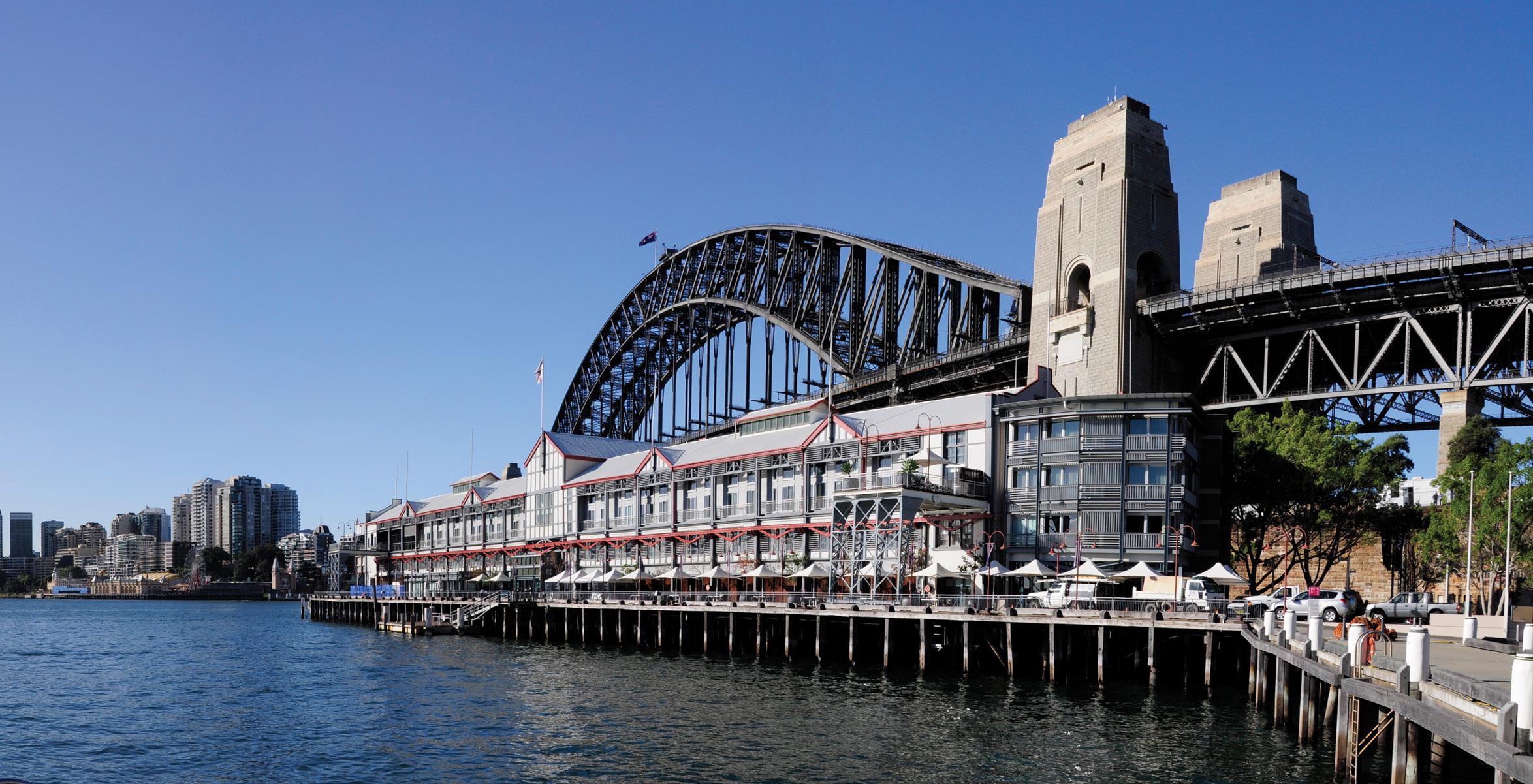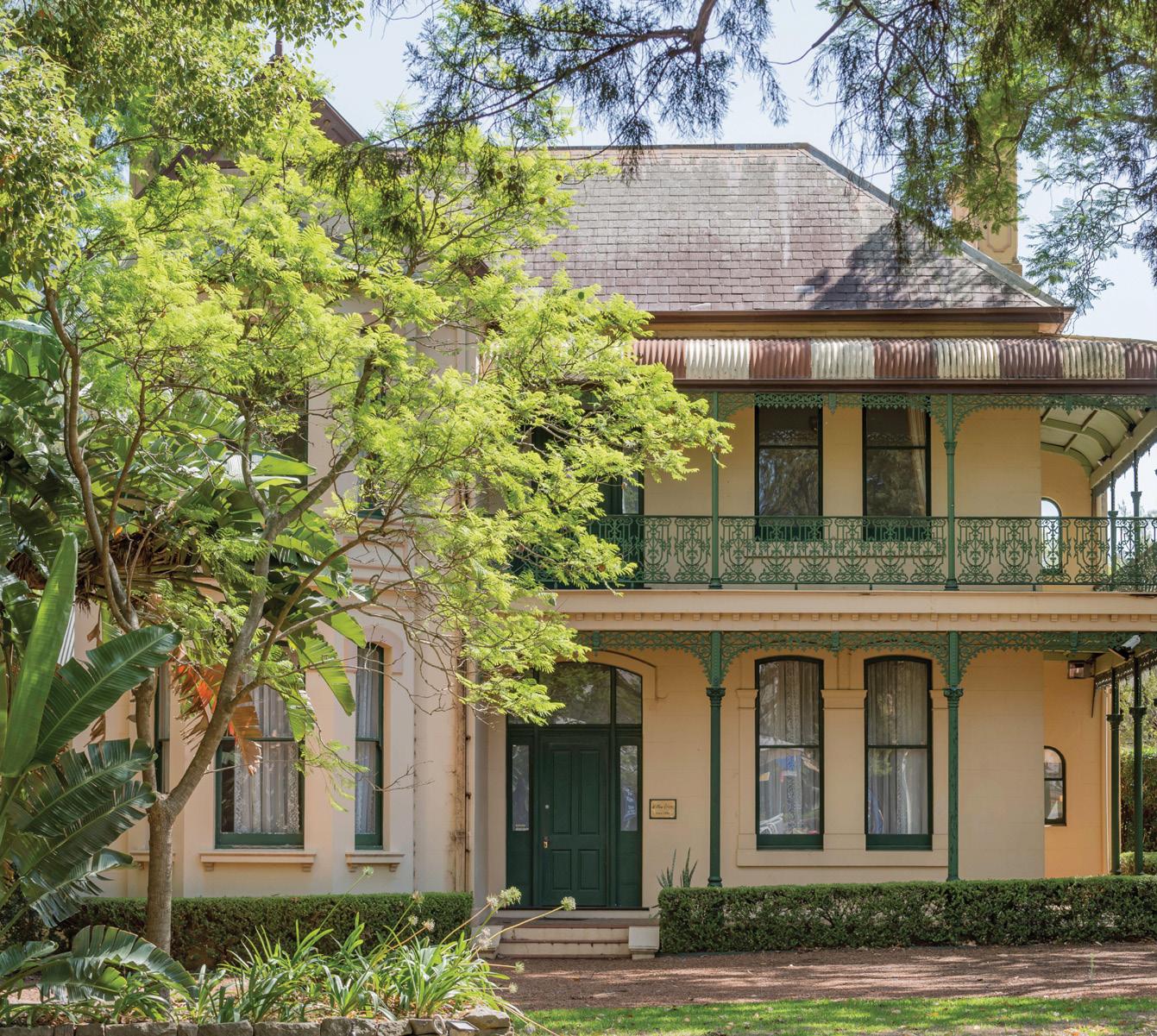
8 minute read
Protect
NSW State Election 2023: Make Heritage Matter
BY DAVID BURDON, NATIONAL TRUST CONSERVATION DIRECTOR
In the lead up to the State election on 25 March, the National Trust is calling on candidates to consider and commit to four key areas of heritage conservation if they are elected.

Opposite The award-winning Dawn Fraser Baths in Sydney’s Balmain were restored and adapted by TKD Architects to cope with rising sea levels. The National Trust is calling for sustainable development of heritage buildings to be incentivised (photo by Arthur Vay, Sydney Site Photography).
Left Proposed development at Central Station adjacent to the approved Atlassian Tower envelope – both towers are built on top of heritage items within the State-heritage listed precinct. Without protection from the Heritage Act, these places remain under threat (Bates Smart Architects image).
The world has changed dramatically since the last State election in 2019. The impacts of a global pandemic have been felt in NSW, not to mention the widespread devastation caused by fires and floods. Among the many issues that will no doubt form part of a broader discussion, the National Trust is working hard to ensure that the protection of our natural, built and cultural heritage is on the political agenda. Recent announcements regarding the scrapping of proposed plans for Barangaroo offer a glimmer of hope that heritage may finally gain some recognition as a component of good planning and government stewardship, however current proposals affecting Sydney’s Central Station and Parramatta’s St John’s Cathedral precinct provide a stark warning that continued vigilance is essential.
Reinforce legislative protection In May 2021, at the request of the State government, the Legislative Assembly Social Issues Standing Committee commenced a review of the NSW Heritage Act. The National Trust played an important advocacy role during this review. Our own detailed submission was joined by more than 300 others, many of which supported our position that the current Act did not require extensive change. The Standing Committee published its report to the government in October 2021, and the government response supported in full, or in principle, 25 of the 26 recommendations made – many of them proposed by the National Trust. The government is now in the process of drafting a Heritage Bill to amend the Act, which will undergo further consultation.
While the review process has shown that current controls are largely satisfactory, it has also highlighted that the Act would be more workable if it was administered more consistently and in a timely manner. Of particular concern, sections of both the Heritage Act and the National Parks and Wildlife Act can effectively be ‘turned off’ or overridden when a project or application is deemed to be State Significant Development (SSD) or State Significant Infrastructure (SSI), under a provision of the Environmental Planning and Assessment Act.
This bizarre situation where our heritage legislation can simply be turned off is unique to NSW, and is one of the reasons why items that are formally listed on our State Heritage Register – such as Central Station – continue to be at great risk and without adequate heritage protection. In fact, analysis prepared by the National Trust highlights that there has been a dramatic escalation in the number of projects designated either SSD or SSI that have ‘turned off’ the Heritage Act and its protections for their impact assessment, up from 48 in 2005 to 402 in 2021 (source: Heritage Council of NSW Annual Reports, 2005 – 2022). It is only by enabling, rather than disabling, the Heritage Act's protections that we can hope for any serious retention and conservation of our heritage places.
Increase funding for local heritage At present there is a genuine imbalance in the approach to resourcing conservation and management of heritage in NSW, which is negatively affecting places considered to have protection. The majority of listed heritage items in NSW are locally listed – some 40,000 – yet the bulk of administration and funding is focused on State-heritage listed places.
Many councils in NSW have insufficient resources to adequately

What the National Trust is advocating for in the 2023 NSW election
1. Stop disabling the State’s heritage legislation.
Repeal Section 4.41 (c) and (d) of the EPA&A Act. 2. Commit to stand-alone Aboriginal Cultural Heritage legislation. Table an Aboriginal Cultural Heritage bill in 2023 and ensure it's properly resourced. 3. Develop options to better protect remnant urban bushland and significant trees across NSW. 4. Legislate the mandatory consideration of the
Government Architect's Design Guide for Heritage. 5. Make grants available for operational costs of heritage organisations, museums and galleries. 6. Incentivise adaptive reuse of buildings to encourage sustainable development and reduce carbon footprints. 7. Ensure the NSW Government properly cares for the State’s heritage as a responsible custodian of these precious heritage assets. 8. Ensure funding is made available so that every local council can employ a local heritage advisor.
manage places on their local heritage register. In some cases, the number of items listed is also sadly lacking despite there being many properties that potentially qualify. Some councils do not have a heritage adviser at all, while others have access to overstretched consultants engaged on the slenderest of contracts – sometimes for just one day of work every two months.
Heritage is one of the reasons many people choose to visit or live in our regional centres. The National Trust is requesting that government commit to establishing an adequate, long-term program for local heritage and ensure that every local council has resources to employ or have access to a heritage adviser. Based on our own experience in offering conservation advice across NSW, we firmly believe that having a dedicated team giving local heritage advice within government will achieve far-reaching results in a cost-effective manner. Financial and practical assistance should also be made available to councils to support thorough significance assessments and ensure local heritage studies accurately identify heritage places.
Look after our heritage As a custodian of many heritage properties across NSW, the National Trust is acutely aware of the importance of regular maintenance to conserve our heritage places – both built and natural. A minor investment at the correct time may not only save a heritage item, but also money and resources in the longer-term. Our members expect us to fulfil our obligations in caring for these places, and ensuring they are conserved for future generations. Similarly, there is an expectation that the State government must recognise its own responsibilities as the largest owner of listed heritage places in NSW – responsible for 54% of all items on the State Heritage Register.
also go a long way towards ensuring they will not suffer from what is termed demolition by neglect. “Now” will always be the right time to replace that missing roof tile, rather than waiting until the whole roof needs to be replaced and the interiors are ruined. This is particularly true of places under government ownership. The National Trust insists that all areas of government are accountable for meeting their statutory obligations under the NSW Heritage Act to ensure these assets are adequately maintained.
We are asking candidates to support an increase in funding and higher prioritisation of resources to conserve, re-use and activate heritage-listed buildings in government care. Such funding must have as its aim actual conservation outcomes.
Thinking sustainably Making a place safe and accessible is often the first step in finding a viable new or continued use for many heritage items. Appropriate adaptive re-use not only brings new life to our heritage places, but it has the potential to generate new business and tourism in both metropolitan and regional communities, and has substantial environmental benefits. The National Trust firmly believes in the mantra that the greenest building is the one that is already there. Too often we see the environmental credentials of new buildings being endlessly promoted, when their construction involves the demolition of a perfectly serviceable structure.
Released at the latest round of climate talks in Egypt (COP27), the 2022 Global Status Report for Buildings and Construction identified that the construction sector accounted for more than 34% of energy demands and approximately 37% of energy and process-related CO2 emissions in 2021. This means that the gap between the climate performance of the sector and the 2050 decarbonisation pathway is widening.
The National Trust supports truly sustainable development that properly incentivises adaptive re-use, retrofitting, and the conservation of existing buildings. There is a stark contrast between the recent awardwinning conservation and adaptation of the nation’s oldest post-1788 tidal pool in Balmain, taking into consideration rising sea levels, and the senseless proposal to demolish enormous portions of the historic 1913 Parcels Post

Heritage places with no protection
NSW State heritage places are increasingly losing protection when the Heritage Act is ‘turned off’ for State Significant Developments (SSDs).
2005
2018
2021
Heritage Act turned off for 48 developments
Heritage Act turned off for 268 developments
Heritage Act turned off for 402 developments
Opposite The award-winning Walsh Bay Arts Precinct turned heritage-listed wharves into a contemporary cultural hub. Projects like these depend on local and government funding (photo by avresa, iStock.com).
Above Parramatta’s locally-listed Willow Grove, dismantled earlier this year to make way for the new Powerhouse Parramatta project (photo by Stephen Dwyer, alamy.com).
What can I do for heritage?
1. Share these issues with your local candidates. Download a letter from our website and email your local candidate. 2. Write to the editor of your local paper. 3. Share our social media posts. 4. Attend our Heritage Forum in early 2023. We’ll share party and candidate responses so you’ll know what each party has committed to heritage. To get updates, subscribe to our enewsletter at nationaltrust.org.au/enews-nsw








